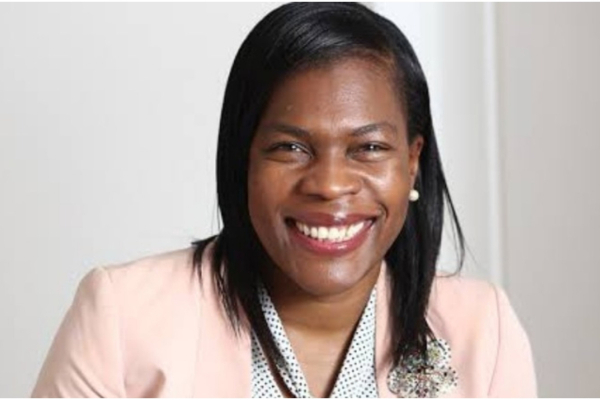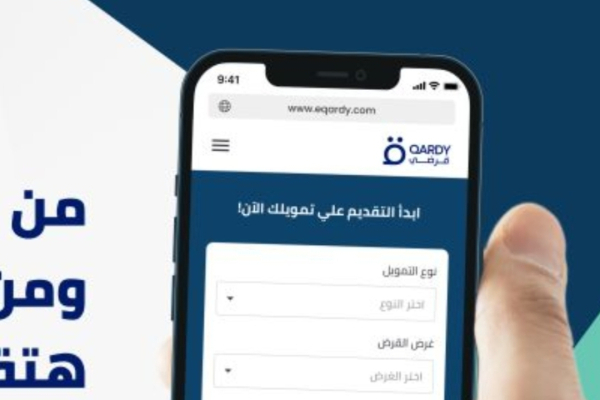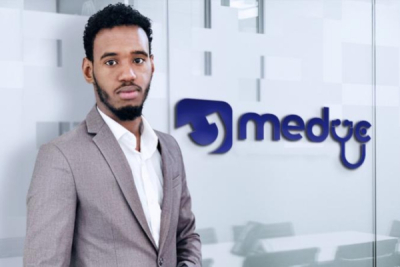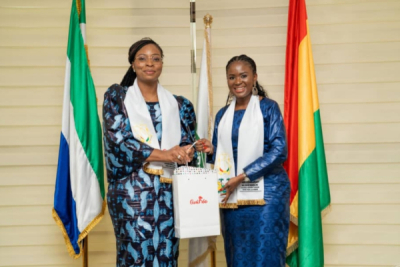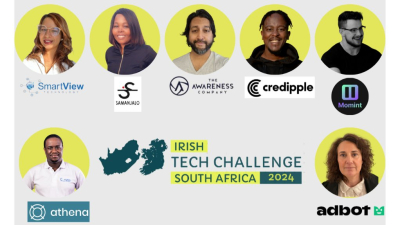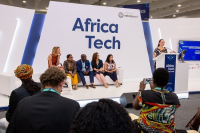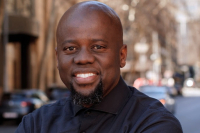After several years working for financial institutions in the United States and Nigeria, she decided to venture into entrepreneurship. Today, she leverages her expertise and new technologies to serve African lenders, thereby making credit more accessible.
Yvonne Johnson (photo) is a Nigerian entrepreneur and investor. As co-founder and CEO of Indicina, a venture capital-backed fintech, she is driving financial inclusion across the continent.
Founded in 2017 by Johnson, Jacob Ayokunle, Carlos del Carpio, and Yemi Ajao, Indicina leverages artificial intelligence and machine learning to streamline lending for financial institutions. The company’s flagship products, Originate and Decide, provide a comprehensive solution for loan origination, management, and risk assessment.
Originate handles the entire loan lifecycle, from issuance to recovery and growth. Decide, on the other hand, offers credit risk models to help lenders make informed decisions and minimize defaults.
Beyond Indicina, Johnson is an active investor and advisor in early-stage tech companies, with a focus on West Africa and the Middle East and North Africa region. She holds a bachelor’s degree in computer science and mathematics from the University of Toronto and an MBA from Northwestern University’s Kellogg School of Management.
Prior to her entrepreneurial ventures, Johnson worked in investment banking at Merrill Lynch in 2008. Subsequently, she served as head of strategy and corporate development at First Bank of Nigeria from 2009 to 2018 before fully dedicating herself to Indicina.
Melchior Koba
Founded in 2022, the solution provides tailored loans to help businesses grow and thrive.
Egyptian fintech solution Qardy offers loans to micro, small, and medium-sized enterprises (MSMEs) and startups. Founded in 2022 by Abdel Aziz Abdel Nabi and based in Giza, it provides loans through a web platform, offering various options including traditional loans and supply chain financing to manage working capital. Loan amounts range from 1,000 to 242,000 Egyptian pounds (about $20 to $4,800).
Currently, Qardy has no mobile app. Users access services directly through the web platform. It assesses MSMEs based on annual revenue, creditworthiness, and stability. Loan approval can take up to 18 days, depending on application complexity. Qardy can provide multiple loan types to a single business, tailoring offerings based on individual needs.
In August 2024, it raised an undisclosed amount of funding to fuel growth.
“The support and trust of our investors have been instrumental in driving our growth and enabling us to expand our reach and impact in the market. This investment will allow us to further enhance our services, as well as accelerate our plans for expansion in Saudi Arabia and the region,” said Tamer El-Manasterly, Qardy’s chief operating officer.
Adoni Conrad Quenum
After five years of medical studies, he ventured into entrepreneurship by developing a telemedicine platform. The platform allows Djiboutians to receive medical care without leaving the comfort of their homes.
Moubarik Mahamoud (photo) is a Djiboutian entrepreneur well-versed in technology, healthcare, and communication. He is the founder and CEO of Medyc, an innovative startup in the healthcare sector.
Founded in 2020, Medyc specializes in e-health. The startup has developed an online teleconsultation platform that connects patients with healthcare specialists. This solution enables patients to easily access doctors, monitor their health, and evaluate the effectiveness of their treatments, all while enjoying the convenience of remote care.
In addition to teleconsultations, Medyc provides home care services, medication delivery, and direct supply of medical devices to patients. The platform centralizes users' medical information, offering simplified and secure access to health data. A connected laboratory feature allows patients to review their test results and receive interpretations.
Simultaneously, Moubarik Mahamoud serves as the Executive Director of Vivaway.co, an investment platform that allows users to grow their savings through investments in companies, either via equity acquisition or direct loans. The platform also offers businesses a new avenue for financing.
As a consultant in communication and web development, Mahamoud leverageshis expertise to create, manage, and optimize web and multimedia projects.
He completed five years of medical studies at Gamal Abdel Nasser University in Guinea from 2014 to 2019. In 2022, he earned a master's degree in management and business administration from the University of Paris 1 Panthéon-Sorbonne, along with an executive MBA from Sorbonne Business School in the same year.
Melchior Koba
Algerian authorities want to equip the population with digital skills. One of their strategies to achieve that goal is to provide primary schools with dedicated tools.
Algeria is set to equip an additional 1,700 primary schools with digital tablets, as announced by Abdelhakim Belaabed (photo), the country's Minister of National Education, on Thursday, August 8. This announcement was made during a national conference focused on implementing the operational plan for the upcoming 2024-2025 school year in Mostaganem.
"This year, 1,700 primary schools will receive digital tablets, increasing the total number of schools equipped with such technology to 5,000 nationwide," Belaabed stated.
Since taking office in 2019, President Abdelmadjid Tebboune has prioritized digital technology as a key component of Algeria's development strategy. The COVID-19 pandemic has further accelerated the nation’s digital transformation efforts. According to the "Measuring Digital Development – ICT Development Index 2024" report released by the International Telecommunication Union in June, Algeria's ICT Development Index is 80.9 out of 100, placing it sixth in Africa.
This initiative aims to provide the population, especially primary school students, with essential digital skills. The introduction of digital tablets is expected to enhance students' digital competencies, promote inclusive education for those with special needs, and enable real-time tracking of students' progress, facilitating continuous assessment and the adaptation of teaching methods.
Adoni Conrad Quenum
African countries are now recognizing the benefits of interstate collaborations in achieving their digital goals. Numerous initiatives are emerging, bolstering joint efforts to accelerate the continent's digital transformation.
Sierra Leone and Guinea plan to strengthen cooperation in the digital sector, with plans for network interconnection, knowledge sharing, infrastructure development, and joint projects to spur digital growth.
For that purpose, a delegation led by Sierra Leone’s Communications, Technology, and Innovation Minister Salima Manorma Bah visited Conakry on Friday to discuss the partnership with Guinean Posts, Telecommunications, and Digital Economy Minister Rose Pola Pricemou.
“The goal is to translate the shared commitment of Guinea and Sierra Leone into concrete actions to build a dynamic and inclusive digital ecosystem in the region,” Guinea’s Digital Economy Ministry said. A meeting of private sector representatives from both countries is planned to outline technical details for the enhanced partnership.
The potential cooperation aligns with digitalization efforts underway in both countries to use technology for societal transformation and economic development. The talks follow Pricemou’s announcement of a possible interconnection between the two nations at the China-Africa Digital Summit in Beijing last month.
A successful partnership could improve connectivity quality and reach while lowering costs. Expanded internet access and shared expertise would accelerate digital transformation and promote inclusion for both populations.
Samira Njoya
Seven South African tech startups have been selected for the third Irish Tech Challenge South Africa, to build partnerships between South African entrepreneurs and Irish tech expertise.
Selected companies include SmartView Technology, Momint, and The Awareness Company, all contributing to the UN’s Sustainable Development Goals.
They were selected out of over 350 applicants in an initiative organized by the Embassy of Ireland in South Africa and partners.
They will receive up to EUR10,000 each, a trip to Ireland for business networking, and support from Dogpatch Labs.
The 27th Africa Tech Festival, scheduled for November 12-14, 2024, in Cape Town, is set to shine a spotlight on the significant contributions of women in Africa’s tech and telecom sectors. This year’s festival will feature prominent female leaders such as Funke Opeke, CEO of MainOne, and Mary Mahuma, CIO of Philip Morris, who will share their insights on the future of the industry.
The event, which includes AfricaCom and The AI Summit Cape Town, is expected to attract over 15,000 attendees. Organizers are emphasizing the festival’s role in promoting inclusivity and mentorship within the tech community. A highlight of the festival will be the InspiringFifty Africa awards, which recognize the top women in tech across the continent.
Establishing Digital Free Zones is a critical step for African development, as it positions the continent as a key player in global digital trade. This initiative will attract investment, create jobs, and enhance the continent's economic competitiveness by creating an environment conducive to tech, finance, and service-oriented businesses.
Nigeria's government has launched an initiative to establish Digital Free Zones to position the country as a hub for global digital trade and innovation. This was announced by the Federal Ministry of Information and National Orientation in a press release dated August 7. The initiative, chaired by President Bola Ahmed Tinubu, aims to attract and support tech, finance, and service-oriented businesses by creating a conducive environment tailored to the needs of the 21st-century digital economy.
“As we embrace the concept of digital free zones in Nigeria, we are presented with a unique opportunity to drive local domiciliation of global technology companies to boost skills development and job creation in innovation and technology, and contribute to the local economy...,” said Minister of Communications, Innovation, and Digital Economy, Dr Bosun Tijani.
According to the release, a steering committee has been formed to oversee the creation of the digital free zones. The committee is led by Finance Minister Wale Edun as Vice Chairman and includes key government officials like the Attorney General, Ministers of Communications, Industry, Interior, and heads of relevant agencies.
The committee will collaborate with relevant government agencies and private stakeholders to modernize Nigeria’s outdated free zone policies and regulatory framework. This effort includes creating and releasing new policy and operational guidelines, enabling global and local technology, finance, and service-based businesses to establish Pan-African or global operations from Nigeria.
Businesses operating within these zones will benefit from modernized free zone regulations, including tax, banking, and immigration incentives, simplified government compliance processes, and a stable regulatory environment.
Nigeria's Information and Communications Technology (ICT) sector significantly contributed to the nation's economy in Q4 2023, accounting for 16.66% of the real GDP, according to figures released by the National Bureau of Statistics (NBS). This underscores the country's increasing reliance on technology for economic growth. The establishment of Digital Free Zones aligns with this trajectory, positioning Nigeria to attract global tech and service-oriented businesses. By stimulating innovation and expanding the ICT sector's GDP contribution, these zones can transform Nigeria into one of the leading African digital hubs, fostering economic diversification and digital transformation.
Hikmatu Bilali
The company is rebranding and upgrading its services to expand its reach in the African tech market.
Pan-African venture capital firm Founders Factory Africa announced on Wednesday, August 7, that it has rebranded as 54 Collective. The company has evolved its business model to better support technology enterprises across the continent.
Founders can now rely on the firm’s expertise and network to help grow their startups. The firm plans to invest up to $500,000 in equity and non-dilutive capital across various startups. Additionally, female founders will receive an extra $150,000 to help address access inequalities.
“Our name change to 54 Collective communicates our continued commitment to African founders. We are more supportive than ever of unlocking opportunities for entrepreneurs and ensuring a level playing field for youth and women founders,” explained Bongani Sithole, CEO of 54 Collective.
In recent years, African startups have attracted less capital. To combat this trend, venture capital firms have been established across various sub-regions of the continent to support promising projects. In March, South Africa's Conducive Capital launched with a goal of raising $50 million to back the continent’s startups. In June, the Paris-based venture capital firm Breega established a new $75 million fund, Africa Seed I. The rebranding of 54 Collective aligns with these efforts.
Despite funding challenges in Africa's tech sector, startups have secured over $1 billion this year, according to the database Africa: The Big Deal.
Adoni Conrad Quenum
While living in Germany, he faced challenges accessing credit. To overcome this hurdle, he developed a tech platform that helps users save money toward their personal goals.
Ahmed Wadi is an Egyptian computer scientist and entrepreneur, serving as the founder and CEO of Money Fellows. His mission is to enhance financial inclusion in Africa by providing interest-free credit and savings solutions. Established in 2016, this fintech startup offers a more accessible and affordable alternative to traditional banking services.
“I got the Money Fellows idea in 2016 while I was in Germany trying to save money and access credit. It wasn’t easy because I wasn’t born in Germany, and I had difficulty finding ROSCAs (Rotating Savings and Credit Associations). This prompted me to think: why not modernize and digitize this age-old savings model and give people worldwide the opportunity to participate in ROSCAs together?” Wadi explained in 2022.
The platform enables users to join savings circles, maximizing their savings returns. Users can tailor their plans by setting specific goals, desired amounts, and payment methods. Contributions range from $5 to $400, with savings plans available for six, ten, or twelve months. To date, over 4 million people have utilized the platform. As of July 2024, the startup is preparing to expand into Morocco.
Prior to founding Money Fellows, Wadi launched Objectly in 2005, a software solution for tracking objects using IP cameras. Until 2006, he worked closely with Microsoft’s innovation center in Cairo to refine his algorithms.
Wadi graduated from the University of Stuttgart in 2009 with a bachelor's degree in computer science. He also holds a master's degree in information technology from the Technical University of Munich, which he earned in 2014. Following his studies, he began his career as a developer at the National Bank of Kuwait in 2009. In 2010, he joined Magneti Marelli, an automotive supplier, as a software engineer. From 2011 to 2013, he worked as a software developer at Alpine Electronics R&D Europe in Germany.
Melchior Koba
More...
Senegal has embarked on a public service reform initiative aimed at restoring the trust between the government and its citizens. Collective participation is encouraged to maximize the outcomes.
Senegal’s Minister of Public Service and Public Service Reform, Olivier Boucal, on Thursday launched the first edition of the “Gov’Athon,” an initiative aimed at generating ideas and practical solutions to modernize the country’s public administration.
“Inspired by innovation competitions commonly known as hackathons, the concept reflects my desire to pool resources and build collective intelligence to address the concerns of public administration users. The 'Gov'Athon' is a unique opportunity to rethink our administration. By mobilizing Senegalese youth, we hope to discover innovative ideas that can transform our public services and effectively meet the needs of our citizens,” Boucal said.
Participating teams, composed of students from both public and private universities nationwide, will compete to develop solutions across several key areas. These include public service transformation, education and vocational training improvement, sustainable agriculture and livestock development, urban mobility optimization, air transport innovation, and local tourism promotion.
The Gov’Athon is part of Senegal’s broader plan to modernize the administration and build a sovereign, prosperous nation, in line with directives from President Bassirou Diomaye Faye.
The month-long competition will award prizes of XOF20 million (about $33,200), XOF10 million, and XOF5 million to the top three teams. Winners will also receive three months of free coworking space access and equipment vouchers to aid in solution implementation.
Samira Njoya
Pan-African independent school network Nova Pioneer has partnered with Strathmore University to develop an AI curriculum for K-12 students in Africa, focusing on grades 7-12. The pilot program, part of Nova Pioneer’s Innovation and Leadership Programme, will launch in 2025 for Grade 8 students.
The initiative, announced on August 2, aims to equip African youth with essential AI skills. Over the next five years, the partnership will also create AI Impact Camps and an African Innovation Fund to support students in bringing their ideas to life.
With degrees in finance and human physiology, he turned his focus to the healthcare industry. Using technology, he created an innovative solution to simplify medical bill payments for patients.
Jabulani Nyembe, a South African entrepreneur, is dedicated to improving access to healthcare services for all. He is the founder of Athena, a startup that creates solutions to make healthcare payments more manageable.
Founded in 2022, Athena allows patients to split their healthcare payments through its platform while gaining immediate access to necessary care. It facilitates the financing of co-payments and out-of-pocket medical expenses. With Athena, repayments can be spread over 3 to 6 months, and the startup claims to be more cost-effective than other credit solutions, charging only administrative fees. It helps users develop payment plans for medical expenses ranging from 500 rands (about 27 dollars) to 30,000 rands.
Before launching Athena, Jabulani Nyembe founded Clinalytics in 2018, where he served as CEO until 2022. Clinalytics provides software solutions to private practice physicians, helping them reduce workload, digitize medical records, and utilize analytics tools to improve clinical outcomes.
Nyembe holds a bachelor's degree in human physiology from the University of Pretoria and a bachelor's degree in finance and economics from the University of KwaZulu-Natal. After his studies, he worked as a clinical data analyst and administrator in 2017. In 2018, he joined Amanzi Social Enterprise, an Enactus project aimed at addressing water scarcity in South Africa, as a project manager.
Melchior Koba
African countries are currently undergoing a digital revolution that is profoundly shaping their economic development and social progress. Appropriate regulations play a key role in this transformation.
The digital studies firm Think Tank Law and Technologies has now established offices in the Democratic Republic of Congo (DRC). On Tuesday, August 6, in Kinshasa, the Minister of Posts, Telecommunications, and Digital Affairs, Augustin Kibassa Maliba (photo), officially launched their activities. This initiative aims to promote research and analysis on legal issues related to the digital realm.
"We aim to support and contribute to discussions on digital and technological law. We have conducted studies and analyses on significant legal topics within a technological context. Today, at our official launch, we presented our first study, which focuses on the legal framework for personal data protection in the DRC. This study has led to several recommendations for the government and the private sector," stated Prosper Ntetika, President of Think Tank Law and Technologies.
The bureau's activities include research and analysis on legal and regulatory issues related to digital technologies in the DRC; promoting dialogue and collaboration among experts, researchers, policymakers, and private sector players; contributing to the development of public policies, digital development strategies, and legislation tailored to the DRC's technological context; raising public awareness about the legal and regulatory challenges of digital technologies; and providing training in technology law, among other things.
The launch of the bureau's activities comes as the DRC pursues the objectives of the National Digital Plan – Horizon 2025, where the legal framework is a crucial pillar. According to President Félix Tshisekedi, establishing a solid institutional and legal framework is necessary to govern and regulate this particularly promising sector.
With its team of legal experts, Think Tank Law and Technologies is well-positioned to assist the DRC in creating a robust regulatory and institutional framework. This support is vital for fostering the country's digital development, ensuring legislation that keeps pace with technological advancements, and effectively protecting citizens' rights in the digital age.
Samira Njoya


